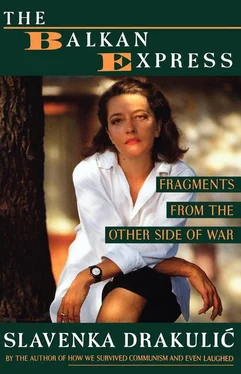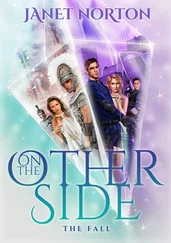But what was the President doing, there in the same square, while several hundred people stood in the rain, unable to voice their disillusionment? Did he know about it or had his advisers, his secretaries, his bodyguards, his servants simply told the President that there had been some minor problems with the trams running in this rain (‘You know, Mr President, how capricious these trams become in wet weather,’ someone could have said to him). I went back to the cafe. He still sat there, and just as I arrived I saw a short woman dressed all in black with messy hair, maybe in her fifties pass the bodyguard and stop by the President. She began to talk to him in what seemed a calm tone of voice. As the President turned his head in surprise two men rose from their chairs and grabbed the woman’s arms. The situation was tense, some people stood up in confusion. Some left. But the woman just stood there talking (he obviously didn’t order her out) as if she didn’t care what happened to her. When the bodyguard let her free she pointed several times to the mass of people whom he hadn’t, or didn’t want, to notice. He shook his head. To everything this woman said he simply shook his head. That was all he did: I never saw him once open his mouth and talk to her. The woman went out, her face racked with pain. People in the cafe sat back and continued to drink, gesticulating. The President continued to talk to a man on his left as if it had been just another unimportant interruption, a little incident that would do nothing to disturb his intention of spending a peaceful, pleasant Saturday morning in this cafe in the city of his great victory. After all, this kind of thing must be expected to happen when one is President but wants to go out just as an ordinary citizen. And this is what bodyguards are for, to take care of such little nuisances. But the woman didn’t go away. She stood there, in front of the cafe, pale and beside herself, looking as if she’d faint any minute. To the small group of people who gathered around her she explained that she had gone in there as a delegate of the protest meeting to ask the President to address them. ‘I didn’t ask him to give us a speech, just to come and greet us, to say a couple of nice words to the citizens of the non-existent city,’ she said, her voice cracking under the heavy burden of her words. ‘But our President is drinking coffee on Jelacic Square while his people, his fighters, stand in the rain waiting. Waiting for what? Now we know that we are not worth even a few words any more…’
The crowd in front of the cafe was growing, but not a single hostile voice was raised. They were in a kind of stupor, a stupor of disbelief. The fact that the President couldn’t even bother to acknowledge them was so painful that they could barely speak, as if such a level of arrogance was hard to imagine and now that their city had disappeared, it would be best if they disappeared too. For how many of the 1.2 million citizens of Zagreb came to the square to greet them or offered help in support of their demands? As my colleague remarked, one could single out without difficulty almost every person from Zagreb who had come – as if people from Vukovar were in some way contagious, bringing a germ of war to the city that was trying so hard to forget. ‘Perhaps it would be better if we all got killed, not only ten thousand of us,’ said a young boy, and I could feel that there was anger in his voice when he added, ‘I’ll never forget this’, but more as if he were angry at himself or his other fellow-citizens for coming there at all.
I went back to the cafe window. Behind it, as if in a big aquarium, the President stood up. He’d decided that he had had enough of his stroll for today, enough of seeing his own people too. Smilingly he shook hands with some of the customers who were obliged to acknowledge that he was not an ordinary visitor after all. Oddly enough, from where I stood, it looked as if he were congratulating them on something. Leaving the cafe he turned back and waved to the waiters with his left hand – how quickly, how easily new leaders learn that imperial gesture! Meanwhile the group outside stood waiting for him, to come out and perhaps to stop for a moment. But he crossed the threshold and just passed by. He didn’t look to his left, where it was obvious that something was happening, not even out of curiosity. As he passed the group there was a stiff silence. I heard one man coughing nervously. Then the tall man who had addressed the meeting at the start, to tell them that the microphones had been cut off, went after the President. Approaching him from behind, he took the President by the sleeve of his coat. The President turned around; again there was a nervous jam around the two of them. Someone pointed at another man standing next to the President whom, I recognized as the Prime Minister. So the man from Vukovar then approached the minister and started to talk to him instead. Together they went back to the group. The President stood for about five minutes watching it all from the edge of the square, waiting for his Prime Minister to return. I took a closer look: the President was tall, taller than I imagined from TV pictures. He was good-looking too, for a seventy-year-old man, dressed in a well-tailored black coat, with grey hair and a straight, somewhat rigid posture that indicated an ex-soldier. There was an air about him, as he looked around, of a general surveying the battlefield with an expert’s eye. Concluding that at that moment there was no battle worth fighting, he turned his back on the square and left.
The Prime Minister was left behind to argue with a group of a dozen or so. The same woman who had approached the President approached him too, perhaps repeating the whole story or asking for an explanation. All I could hear were his words in a high voice: ‘But I promise you…’ To this day I don’t know what his promise was or if he kept it at all. When he too left the group they returned to the gathering on the other side of the square still waiting in the rain that was now pouring down. By now many people had left, the journalists too (not much of a story here, they thought). Hawk stood there smoking and nodding at the story about the President that the tall man was telling him: ‘I knew, I told you that he was not going to do that,’ he said. Again I thought how strange it was, this visible absence of anger, as if people were too tired, too devastated to bother with anger.
At that moment, as I looked at them clustered around talking to each other, the survivors of Vukovar seemed to me to have lost yet another battle in this square where the President was taking his coffee, humiliated by the fact that he didn’t want to be disturbed by some protest meeting, that he didn’t want to hear about Vukovar any longer. At least not now, not today, Saturday 22 February. On this day he had other, more important things on his mind. They were invisible for him, nonexistent from where he sat, from the broad historical perspective he clearly had in view: the independence of Croatia recognized by the European Community just a couple of days ago, the realization of a thousand-year-old dream of the Croatian people, diplomacy, big powers, the enemy. Who could blame him for not noticing a few hundred people in Jelacic Square?
It was at five minutes to two when the President left the square. A small incident was over, the case of Vukovar publicly closed, the war almost over, or so he thought at the time. This was the first time I saw the new Croatian President Franjo Tudjman.
ZAGREB MARCH 1992
16
THE WOMAN WHO STOLE AN APARTMENT
Iwould have never had thought that a timid, fragile girl like her was capable of stealing anything, much less a whole five bedroom apartment. Probably she didn’t consider herself a thief either, which is precisely the problem. But nevertheless, this is what she tried to do.
Читать дальше












